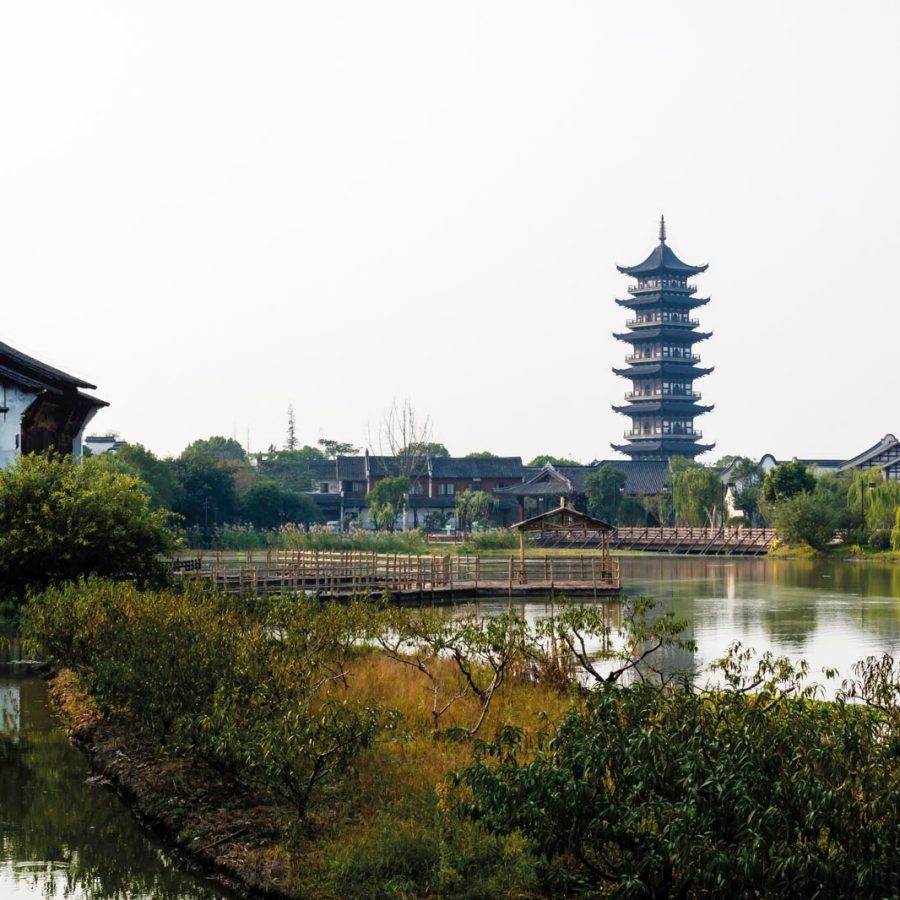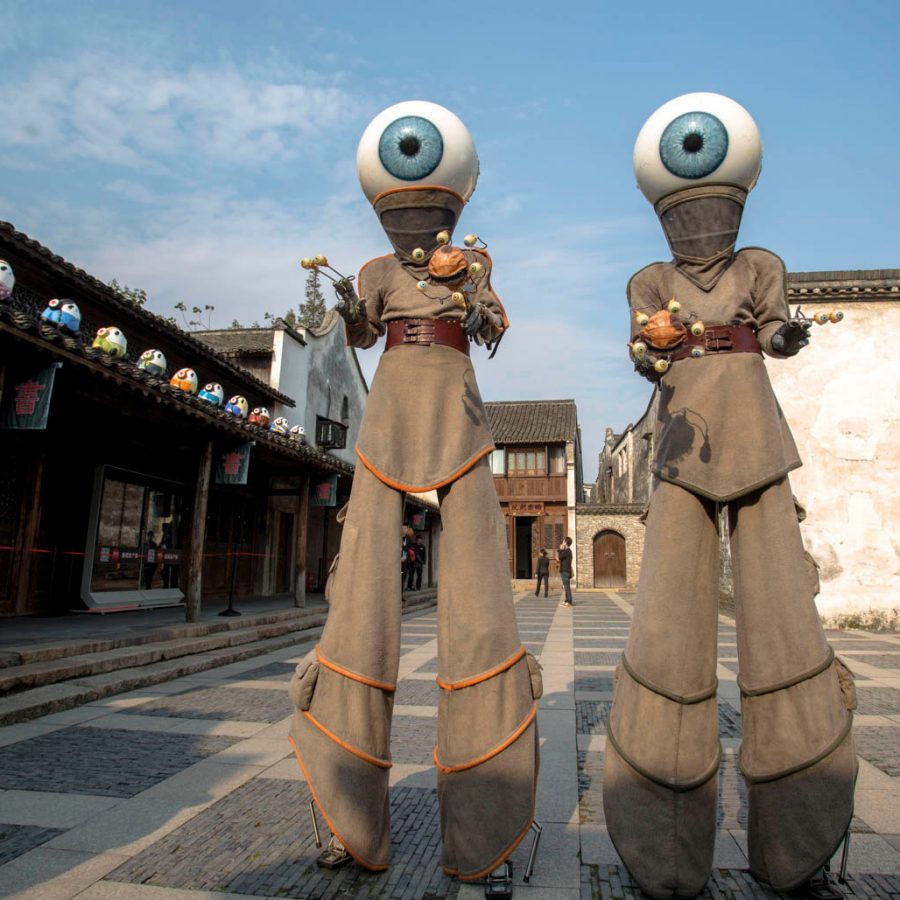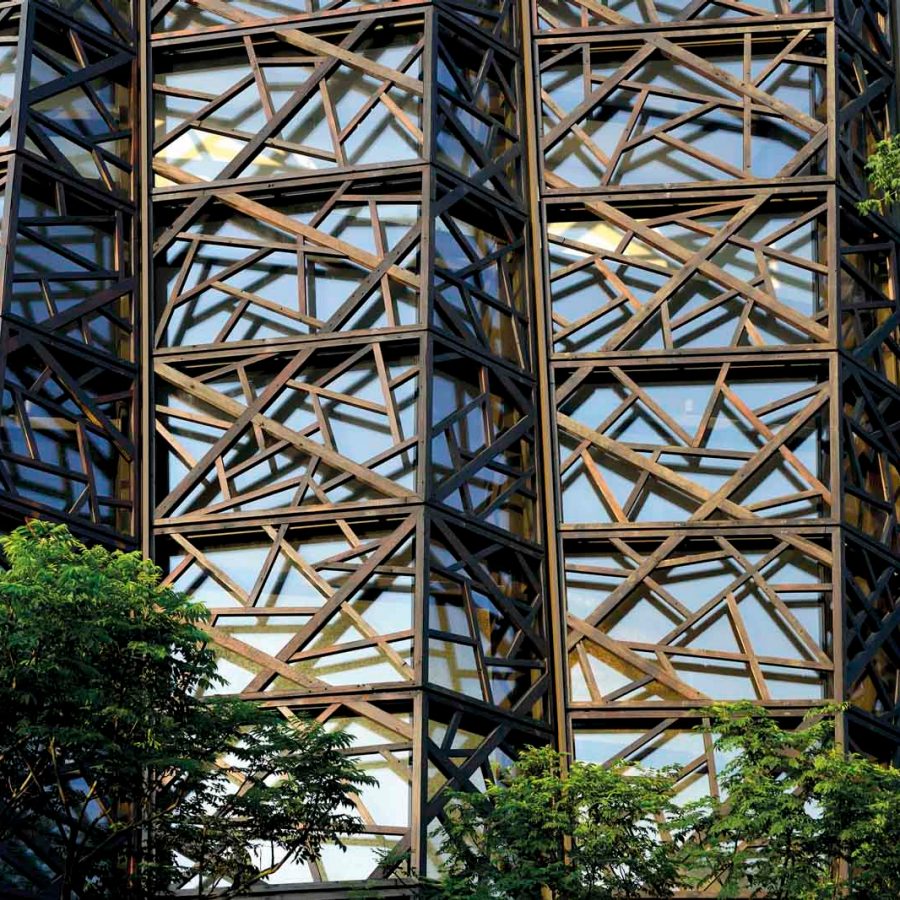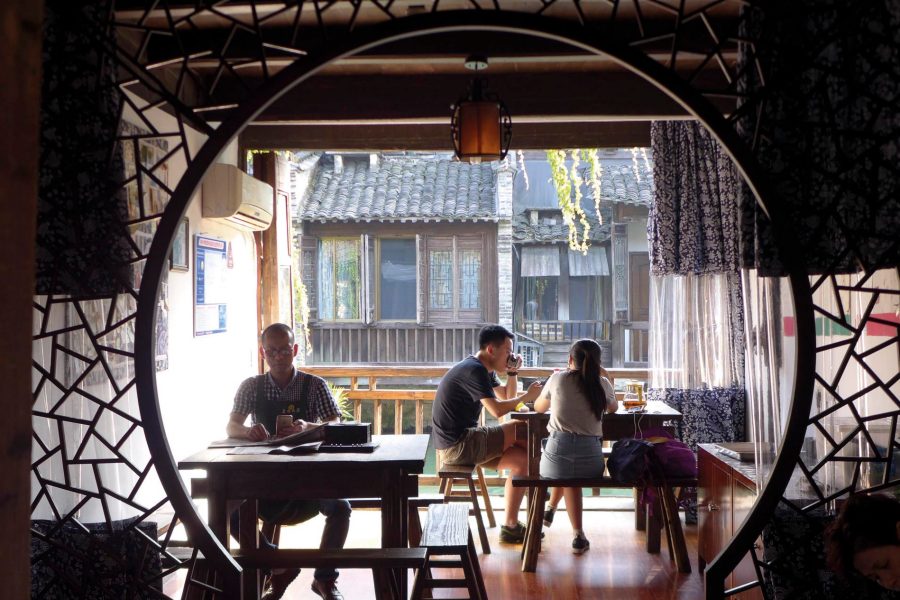Sitting on a rickety wooden boat manned by Mr Wu, an old man whose face shifts remarkably quickly between scowl and smile, we creak slowly through picturesque canals connected by carved stone bridges and edged by lush, leafy trees swaying from the banks. Dark rooftops sweep beneath the blue sky, and residents perch on wooden benches to chat. Light coming through wooden lattice windows bounce off whitewashed walls. Along the way, we see pretty temples, pagodas and halls from ancient clans. Here in Wuzhen, time slows down.
A once-sleepy town close to Hangzhou and Tongxiang (both accessible by high-speed rail) and a two-to-three-hour drive from Shanghai, Wuzhen is an idyllic fantasy of ancient China. The interlinking waterways, once crucial for regional trade and transport, have meant that Wuzhen is often dubbed a ‘Venice of China’ – although this moniker is used liberally among water towns in the country. Today, the town is one of eastern China’s most successful heritage restoration projects.

Credit: Pengwen0924 / iStockphoto / Getty Images

Credit: DuKai photographer / Moment RF / Getty Images
And it’s no wonder it’s attracting 30,000 visitors a day. "A large area has been retained and the original lifestyle of the local residents has been preserved," says Simon Kong, general manager of the newest luxury hotel to open its doors here, Alila Wuzhen. "I love the strolls through the ancient paths here. You can also discover unnamed workshops run by local artisans that produce handmade clothes, shoes and crafts that preserve and revitalise traditional cultures."
The town has prime position along the Grand Canal, a key trade route between Hangzhou and Beijing centuries ago. By the end of the Song dynasty, the region had grown into a flourishing hub. But although it had its fair share of ancient glory, by mid-20th century the town had fallen into disrepair – the water was dirty and the buildings were crumbling. The ambitious HK$4 billion renovation project, which began in 1999 and finished just a couple of years ago, rebuilt and added sparkle to the site. There are completely reconstructed ‘old’ buildings, but many Jiangnan-style traditional residences dating back to the Ming and Qing dynasties also remain.
Wuzhen’s ancient revival was also a very 21st-century project. Walk down Xizha Lu – a main street that entices with its delicious street snacks like fried turnip cake and glutinous rice filled with sweet bean paste – and canal-side teahouses, and you’ll quickly realise that each shop front has a little number and light box at their door, denoting a QR code and digital address where you can access information about each place via the Wuzhen WeChat app. Indeed, Wuzhen is old world beauty functioning on the cutting edge.

Credit: Yi Aidi / Imaginechina
Since it became home to the annual World Internet Conference in 2014 – it’s also called the Wuzhen Summit – the town has been a pioneering model of Chinese ‘smart travel’. Not only does Wuzhen’s official website and WeChat let you book hotels and homestays for the night and buy entrance tickets to attractions through your smartphone, but every shop, restaurant and bar is well-organised with Alipay and WeChat payment enabled. Staff use an iPad to scan my face for check-in at my hotel.
"Being able to connect to Wi-Fi the moment you enter Wuzhen is a prominent upgrade for the iconic water town, an area with so much poetic elegance," says Blue Luo, strategic brand director for Chinese fashion giant EP Yaying Fashion Group, explaining why the brand held its a runway show here last year. "Thanks to the many years of reconstruction and reintegration, it’s getting more and more popular with tourists."
There are two ticketed tourist areas: West Gate and East Gate. The east side has a more traditional vibe, which draws huge crowds. By contrast, on the west side there’s the massive, modernist Mu Xin Art Museum, dedicated to the eponymous artist, poet and Wuzhen native. Sitting atop Yuan Bao Lake, the rigid, imposing structure designed by New York’s OLI Architecture seems to float on water. It houses Mu’s ink paintings, lithographs and calligraphy in permanent galleries, while there are also temporary exhibitions on writers and artists who influenced him.
Not far away is the Wuzhen Theatre, a round building of glass and concrete. The popular Wuzhen Theatre Festival takes over the town each autumn, welcoming Chinese and overseas performing groups. This revival of literary and dramatic arts in the area nods to the town’s rich cultural heritage. Apart from Mu, Wuzhen is also the birthplace of Mao Dun, one of China’s most famous cultural critics and novelists, who worked as Mao Zedong’s secretary and then culture minister from 1949 to 1964. It’s well worth a visit to his charming old residence.

For a bit of quiet and contemplation, head to the Temple of God Guan and the Song dynasty White Lotus Tower Temple, the tallest old building in the area. Nearby, visitors will find places for al fresco meals, with delicious dishes served as you sit on wooden benches with a view of the tower temple, willow trees, bridges and pagodas.
Little shops sell silks, pottery and sweet homemade pastries. The blue-dye floral fabrics are a regional speciality, the tradition upheld by Hong Yuan Tai Fabric Workshop, established in the Qing dynasty. It showcases the old textile dyeing methods, with traditionally printed and dyed cloths hanging from tall wooden poles in the tourist areas – making for some of the most instagrammable sites in Wuzhen.

Credit: BluHue / iStockphoto / Getty Images
Younger visitors end up at cute, modern cafes such as Caffe Bene. And at sunset, West Gate’s famous Bar Street offers evening entertainment. We sit at the 500 Time bar and watch the fairy lights illuminating both sides of the canal as a jovial atmosphere sets in, with groups and couples sipping cocktails or bottles of Wuzhen beer – decent, fruity microbrewery stuff.
The town perhaps only truly feels serene in the early mornings and evenings, when crowds are largely absent. Day-trippers will likely miss the best times, when ambling around the ancient town becomes a quieter, contemplative affair. At night, those wooden boats still creak along the canals, except now under the glow of lanterns. A few lines from Wuzhen’s native poets might fit the mood – good thing I can look them up via Wi-Fi.

Credit: Jeffrey Cheng / Kris Yao | ARTECH
Where to stay
Alila Wuzhen
Opening this month, this luxury hotel is airy and modern, with indoor and outdoor pools, a spa and a speakeasy-style bar. alilahotels.com
Wuzhen Clubhouse
This ornate hotel features traditional Chinese designs that will take you back in time.
Dockside Boutique Hotel
Located on the water banks, this spot is especially beautiful at night when the suites are lit up. docksideboutiquehotel.com
More inspiration
Hangzhou travel information
- China – the Chinese Mainland, Hong Kong SAR, Macao SAR and Taiwan Region
- Hong Kong SAR - English
- Chinese Mainland (China) - English
- Taiwan, China - English
- 香港特別行政區 - 繁體中文
- 中国內地 - 简体中文
- 中國台灣 - 繁體中文
- Africa
- South Africa - English
- Asia
- Bangladesh - English
- Korea - English
- Singapore - English
- Cambodia - English
- 한국 - 한국어
- Sri Lanka - English
- India - English
- Malaysia - English
- Thailand - English
- Indonesia - English
- Maldives - English
- ประเทศไทย - ภาษาไทย
- Indonesia - Bahasa Indonesia
- Myanmar - English
- Vietnam - English
- Japan - English
- Nepal - English
- Việt Nam - tiếng Việt
- 日本 - 日本語
- Philippines - English
- Australasia
- Australia - English
- New Zealand - English
